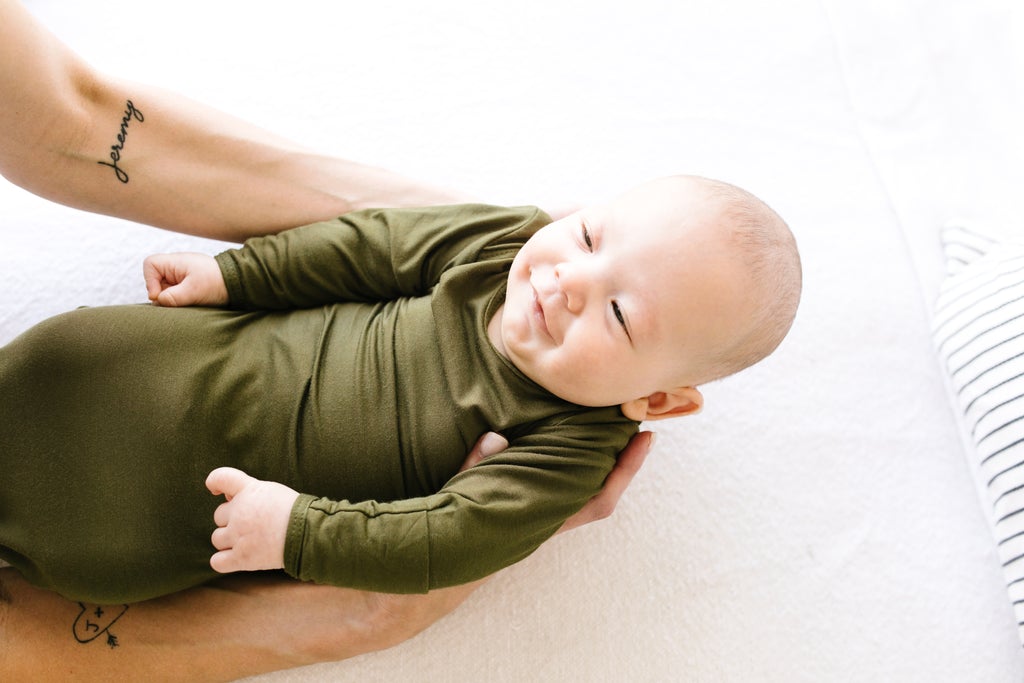
You’ve read all the books and are so close to that big day when your newborn baby will arrive. The nursery is set up, the hospital go-bag is in a special place so that you won’t forget it and you are ready to hold your baby. Everything you’ve read has prepared you for when this moment.
But there are a few things that no one has really mentioned about your baby or what the few weeks after your baby is born is going to look like. Never fear! I have a list of the 12 things you didn’t know about newborns with tips to help you be ready for what’s coming.
1. A newborn baby’s stomach can only hold about one teaspoon after birth.
One tiny teaspoon. But don’t worry, their stomach expands and increases up to 16.5 ounces by the end of the first week. A newborn can lose 5 to 8 percent of his birthweight in the first week, but by the second week should have started to gain that weight back. Over the first four months of a baby’s life, the average weight gain is 5-7 ounces per week.
You will be visiting with your doctor regularly after your baby’s birth and the doctor will check the baby’s weight to ensure that everything is going well. You may consider counting diapers a a gauge after that first week. You may see five to six diapers a day.
2. A Newborn can’t produce tears
Babies do cry, but if you look closely, you won’t see any tears. Newborns have tear ducts and glands, but they only produce enough tears to protect the eye and lubricate. You won’t see any excess tears to roll down their cheeks until your baby is one to three months old. So, pay less attention to their tears and more attention to their cries.
Don’t spend too much try stressing that you don’t understand what your baby needs. Remember that she is new to you and can’t talk. So you are trying to decipher what it is she wants. Give yourself about two weeks to get used to the different cries. You’ll start to get into a pattern and be able to recognize the difference between the “change my diaper” cry and “I’m so hungry” cry.
3. Babies are noisy!
Speaking of crying, babies are really very noisy. Besides cry, they make grunting noises and other strange sound effects. Newborns have swollen nasal passages during the first couple of weeks of life. The mucus and secretions are trapped because the baby doesn’t know how to blow and clear out their nose. This leads to snorting and snoring, as well as sneezes.
To help your baby out, consider getting a baby nasal aspirator to help you clear the stuffy noses. This works better than bulbs and is so much faster to use.
4. Babies identify you by smell.
You may be surprised to learn that your baby’s sense of smell developed before they were born. It’s one of the strongest senses for a newborn. Some say that she will be able to recognize you by your scent by the time she’s a week old.
To help her continue to recognize you, try not to wear highly perfumed products. This helps your baby recognize your natural scent. Also, spend time cuddling with your baby. It’s not just about physically bonding with your child, but it also gives her a chance to continue to familiar with your scent.
5. Newborns can only see objects that are 8-15 inches away from them.
Remember this, especially when someone is trying to put something in front of baby. Newborns have a very limited range of sight.. Babies also prefer to look at faces rather than objects or shapes. Use the opportunity to have your baby interact with others rather than giving them toys to occupy them. This is an important bonding time.
Babies also only see in black and white and shades of gray. They start seeing colors around four months old. You don’t need to worry about having bright colors for their toys until they’re a little older.
6. Newborns sleep a lot, but in very small increments.
Babies sleep 14-18 hours a day or 60–75% of the day. But these are always in small increments. They are usually awake for one to two hours and then sleep for one to two hours. However, make sure that you’re limiting the amount of time each nap is during the day. Babies can mix up day and night so don’t let him sleep longer than three hours during the day before you wake him up for a feeding.
For the first two weeks of his life, wake your baby if he hasn’t eaten in more than four hours. It’s essential to give your baby food to grow and to help you keep your milk supply going. You’ll also want to change his diaper and our newborn knotted gowns are the perfect nighttime outfit to make those diaper changes easy. After those two weeks, once your baby has gained back any lost birth weight, just be grateful when you get a 6-hour stretch of sleep. It will be pretty rare!
7. Your newborn’s first poop is going to be gross.
It’s not going to look like any poops that you’ve seen before. It’s greenish-black poop that has a consistency of tar. It’s called meconium and it’s made up of cells, protein, fats, and bile. It will happen in the first few hours or within the first 24 hours of her birth. Then she’ll start produce transitional stools and finally poop more in line with the food that your baby is eating.
If you’re breastfeeding your baby, her bowel movements will have a mustard color to them and be loose or watery. If she’s formula-fed, her stool will be soft but better formed than a breastfed baby’s.
Make sure that your baby is having a bowel movement regularly. If you have any concerns, you can check with your pediatrician.
8. Your baby will need some help to keep in soft.
While your baby’s skin is extremely soft, that’s because it hasn’t been exposed to water, sun and all the things that life outside of the womb has to offer. If you don’t keep your baby’s skin hydrated and moisturized to make sure that it stays soft.
Look for a hypoallergenic and fragrance-free baby lotion to apply to your baby’s skin. Especially during cool and dry weather conditions. Your baby may also experience pink bumps, diaper rashes and even baby acne after one month.
9. Your baby is going to have a soft spot on their head.
There will be a soft spot on your baby’s head that is a gap between the skull bones. It will close on its own between 9 to 18 months of age. This spot may pulsate because it’s located directly over the blood vessels covering their brain.
You can touch the spot and it won’t hurt your baby. You’re not touching his brain. The soft spots exist so that your baby can move through the birth canal.
10. Some countries have guidelines for naming your baby.
Believe it or not, some countries have laws or guidelines for naming a baby. These guidelines include being able to tell the gender of the child by the first name, the name cannot negatively impact the well being of the child, you must select from a list of pre-approved names or receive special permissions.
While many parents want to give their child a unique name, I don’t disagree that some of these laws might help protect the child from a creative parent.
11. Don’t think that you and your newborn can only be at home.
Even though it’s scary to take your newborn out into the world, you can lead a normal life – just use common sense, especially when going out in public.
Keep your baby out of the sun. Avoid sick people and crowded enclosed spaces. Consider getting a shopping cart hammock from Binxy Baby to help you manage shopping with your newborn and keep them safe.
If you have older children, make them the hygiene police to enforce others washing their hands before touching the baby. Encourage your other children to touch the baby’s feet instead of her hands and face to help curb any passing of viruses.
12. The newborn phase goes by quickly!
The saying is true that if you blink, you’ll miss it. While you may feel like a zombie on most days and just trying to survive, enjoy the moments you do have with your newborn. Keep a journal and record your memories. Take notes on your phone if you don’t have your journal nearby. Take lots of pictures – even if you don’t share them on Instagram, you’ll want all of the pictures when your baby isn’t a baby anymore.

Leave a Reply